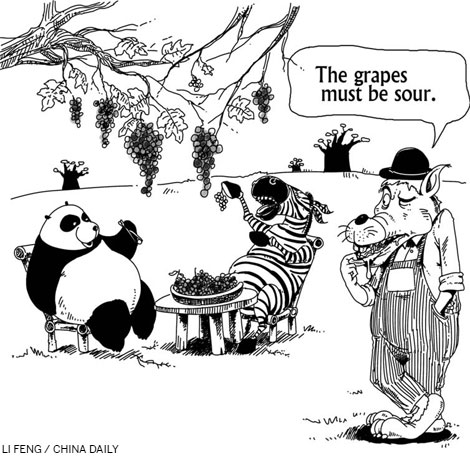Bond of sincere commitment
- By Sehlare Makgetlaneng
 0 Comment(s)
0 Comment(s) Print
Print E-mail China Daily, March 28, 2013
E-mail China Daily, March 28, 2013

Chinese President Xi Jinping's visit to South Africa to attend the fifth BRICS summit in Durban is of crucial importance for Sino-Africa relations. That Xi is visiting Africa on his first overseas trip after becoming president is historic. It shows that Africa's strategic importance for China is increasing.
In fact, China has made it clear that Africa is of strategic importance in its international relations and cooperation. Xi's visit to Africa provides enormous opportunity for expanding relations between Africa and China. China's commitment to expanding Sino-Africa relations calls on the country's new leadership to take appropriate measures to that end and to the satisfaction of African people.
China's intensified engagement with Africa, however, has also given rise to tensions between some of its companies and African workers, which are often played up by the Western media. There is no doubt that Chinese companies, just like their counterparts from developed countries, seek to make profit. The strategic issues guiding the operations of transnational corporations and their use of foreign investment are necessary to understand the key reasons behind Chinese companies' operation in Africa.
The main goal of corporations is to make profit. Their strategic concern is to have access to sources of raw materials and cheap labor, markets for manufactured products and services, and profitable investment outlets for their capital. Their other goals are determined by their ultimate objectives. Such corporations continuously adapt their tactics to safety and security requirements and challenges to remove real or perceived threats to their interests.
The contribution of Western corporations to Africa's development and progress continues to be indirect, not direct. Their contribution towards Africa's development has been the consequence of their operations in the continent, not a result of their intentions. They cannot effectively use Africa's human, natural and financial resources without contributing to its development.
The contribution of Chinese companies to Africa's development and progress is different given the nature of Sino-Africa relations and the fact that most of them are owned by the State. The extent of their contribution to Africa's development will ultimately depend on how China and African countries use their operations to serve the interests and needs of the continent and its people.
Chinese companies are not only operating in the mining, agricultural and energy sectors of the African economy. They are also active in building infrastructure, hospitals, clinics and telecommunication systems. They are not only creating wealth and employment opportunities for the African people, but also contributing towards integration nationally, regionally and continentally. This is of strategic importance for the continent's development and progress as well as for its relations with the rest of the world.
While Western companies make goods available mainly to the middle and upper classes, Chinese companies make them available to the working class. Poor Africans appreciate the fact that they can buy China-made goods because they cost less than those made by Western companies. Central to this development is the fact that they contribute towards their livelihood.
Some scholars maintain that China is no longer a developing country. They argue that the second largest economy in the world cannot be a developing country. But more important than whether China is a developing or developed country is that, Beijing should work with its BRICS partners to deepen the group's political, economic and trade cooperation.
BRICS member states should make sincere efforts to resolve their economic and trade issues, and develop effective ways to manage the competition inherent in their economic and trade relations. Their principal task should be to ensure that their cooperation helps meet the needs, demands and exigencies of their popular national socio-economic objectives.
China's engagement with Africa has started to offset the West's negative impact on the continent. It is now up to BRICS member states to strive towards the materialization of this factor.
Western governments and corporations are embarking on a program of action to ensure that BRICS as a political formation does not negatively affect their strategic interests in Africa. They are trying to ensure that the production structures of African economies remain favourable to Western corporate and security interests at the expense of the continent's development.
This is challenge to BRICS member states. They have to prove that their actions are beneficial to Africa and that BRICS can effectively serve as a global counterweight to the Western project of domination.
The author is a chief research specialist and head of Governance and Security Programme at the Africa Institute of South Africa in Pretoria, South Africa.





